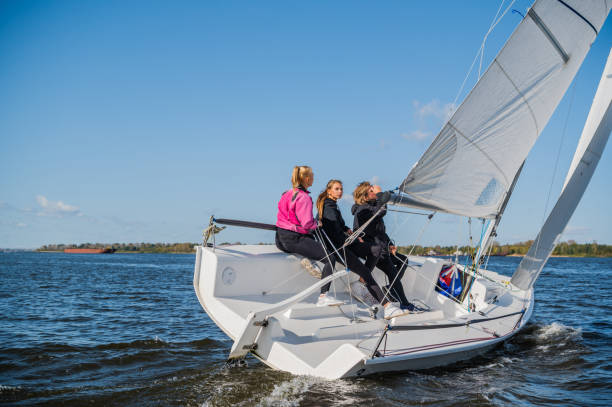3 top benefits of sailing
3 Top benefits of sailing
2-1 Connection with Nature:
Sailing typically takes place in natural environments such as open waters, lakes, or coastal areas. Being surrounded by the calming sights, sounds, and smells of nature can have a therapeutic effect, promoting relaxation and reducing stress.
2-2 Fresh Air and Sunshine:
Spending time outdoors in the fresh air and sunlight has been linked to improved mood and reduced stress levels. Sailing allows individuals to enjoy these natural elements, contributing to a sense of well-being.
2-3 Rhythmic Motion:
The rhythmic rocking and swaying of the boat create a soothing motion. This gentle movement has a calming effect and can promote relaxation, similar to the way rocking a baby helps them fall asleep.
2-4 Mindfulness and Focus:
Sailing requires a high level of focus and attention, especially when adjusting sails, steering, or navigating. The need to be present and mindful in the moment can serve as a form of meditation, helping individuals temporarily detach from stressors.
2-5 Escape from Routine:
Sailing provides an opportunity to escape from the routine and demands of daily life. Being on the water allows individuals to disconnect from work or other stressors, offering a mental break and a chance to recharge.
2-6 Sense of Freedom:
The open water and the sense of freedom that comes with sailing contribute to a feeling of liberation. The absence of walls or boundaries can create a sense of expansiveness, allowing individuals to leave behind constraints and experience a greater sense of freedom.
2-7 Reduced Noise Pollution:
Sailing on open waters often means being away from the noise and distractions of urban environments. The quietude and the sound of water and wind can create a serene atmosphere, reducing the impact of noise-related stress.
2-8 Social Interaction:
Sailing can be a social activity, whether it involves a crewed boat or participating in regattas with others. Social interaction and shared experiences contribute to a sense of community and support, which can positively impact mental well-being.
You can read this blog about this example of camaraderie: sailing with friends in the Bahamas.
2-9 Challenge and Achievement:
Overcoming challenges and achieving sailing goals can provide a sense of accomplishment. Setting sail, navigating successfully, and mastering sailing skills contribute to positive self-esteem and a sense of competence.
2-10 Time Away from Screens:
Sailing often involves a break from electronic devices and screens. Disconnecting from constant notifications and screen time allows individuals to be more present, reducing the mental clutter associated with modern technology.



